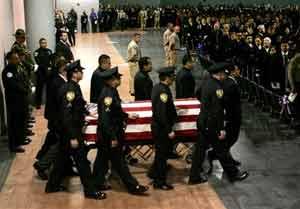Law enforcementLaw enforcement fatalities rise sharply for second year in a row
For the second straight year, law enforcement fatalities in the United States rose with 173 federal, state, and local officers killed in the line of duty during 2011; this represents a 13 percent increase over the 153 officers killed in 2010 and a 42 percent spike when compared to the 122 officers who lost their lives in the line of duty in 2009

Police killed in the line of duty has increased again this year // Source: prensa-latina.cu
For the second straight year, law enforcement fatalities in the United States rose with 173 federal, state, and local officers killed in the line of duty during 2011, according to preliminary data compiled and released by the National Law Enforcement Officers Memorial Fund (NLEOMF).
This represents a 13 percent increase over the 153 officers killed in 2010 and a 42 percent spike when compared to the 122 officers who lost their lives in the line of duty in 2009. The primary cause of death in 2011 was gunfire, which claimed the lives of 68 officers and nearly matched the decade-long high of 69 firearms-related deaths in 2007.
The NLEOMF says that for the past thirteen years in a row, traffic-related incidents had been the primary cause of law enforcement fatalities.
In 2011, though, the number of officers killed on the roadway dropped by 10 percent. There were sixty-four traffic-related deaths among officers in 2011, which matched 2005 for the second-lowest total in the past fifteen years. Of that total, forty-four died in automobile crashes, eleven were struck and killed while outside of their vehicles, seven died in motorcycle crashes, and two were killed when their car was struck by a train.
“Drastic budget cuts affecting law enforcement agencies across the country have put our officers at grave risk,” declared NLEOMF chairman Craig W. Floyd. “At a time when officers are facing a more cold-blooded criminal element and fighting a war on terror, we are cutting vital resources necessary to ensure their safety and the safety of the innocent citizens they protect.” Floyd also noted that the NLEOMF is partnering with the U.S. Department of Justice and the National Highway Transportation Safety Administration, among others, on a number of law enforcement safety initiatives to combat this growing problem.
Floyd cited a recent survey by the International Association of Chiefs of Police that found 60 percent of responding law enforcement agencies had cut back on training, 64 percent had cut back on buying or upgrading major equipment, and 58 percent had cut back on buying or upgrading technology. A report issued in October by the U.S. Department of Justice, Office of Community Oriented Policing Services, stated that by year’s end, it is expected that nearly 12,000 police officers and sheriff’s deputies will have been laid off.
In addition to the officers killed by firearms or traffic-related incidents, twenty-seven officers died as a result of job-related illnesses, four died as a result of falls, two drowned and two were stabbed. One officer died due to each of the following causes: aircraft accident; beating; bomb-related incident; struck by a falling object; electrocution; and strangulation.
During the past year, more officers were killed in Florida, 14, than in any other state; followed by Texas with 13; New York with 11; and California and Georgia with 10 each. Ten of the officers killed nationwide in 2011 served with federal law enforcement agencies. Seven of the officers who died during the past year served with correctional agencies. Eleven of the 173 fatalities were women. On average, the officers who died in 2011 were 41 years old and had served for 13 years.
The preliminary 2011 law enforcement fatality report was released by the NLEOMF in conjunction with Concerns of Police Survivors (C.O.P.S.), a non-profit organization that provides critical assistance to the surviving family members and loved ones of officers killed in the line of duty.
The statistics released by the NLEOMF and C.O.P.S. are based on preliminary data compiled and do not represent a final or complete list of individual officers who will be added to the National Law Enforcement Officers Memorial in 2011.
